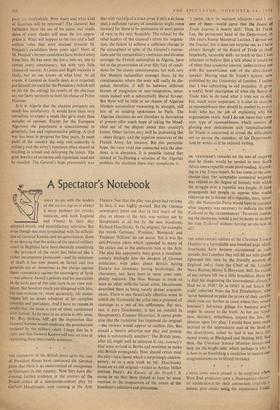THE COMMENTS Of the British press upon the visit of
President Neuss' have convinced the German press that there is an undercurrent of antagonism to Germany in this country. Now they have dis- covered further evidence in the reviews of the British critics of a nineteenth-century play by Gerhart Hauptmann; now running at the Arts Theatre. Not that the play was given bad reviews. In fact, it was highly 'praised. But the German newspapers point out that in fact much of the play as shown at the Arts was written not by Hauptmann at all but by the new translator, Richard Duschinsky. In the original, for example, ' the words 'German,' Prussian,"Bismarck' and 'Emperor William' do not occur. Yet it was the anti-Prussian jokes which appealed to many of the critics and to the audiences now at the Arts. The play has apparently been given a twentieth- century hindsight into the dangers of German militarism, with jokes about Britain having Darwin but Germany having battleships; the characters, too, have been in some cases com- pletely redrawn. The New Woman is made to have an affair with the failed artist; Hauptmann described them as being merely distant acquaint- ances. There is one theatrically effective scene in which she blackmails the artist into a proposal of marriage as a test of his selflessness. But this, too, is pure Duschinsky; it has no parallel in Hauptmann's Einsame Menschen. It seems prob- able that the translator has improved the original —the reviews would appear to confirm this. But should a theatre advertise one play and present what is substantially another? The British press, after all, might well be annoyed if, say, Journey's End were revived in Berlin and rewritten to make anti-British propaganda. How should critics treat the play—as a classic which is surprisingly contem- porary, or as a new work by Mr. Duschinsky based on an old original—rather as Arthur Miller rewrote lbsen's An Enemy of the People? It seems to me that there should at least be some mention in the programme of the extent of the translator's additions and alterations.






































 Previous page
Previous page